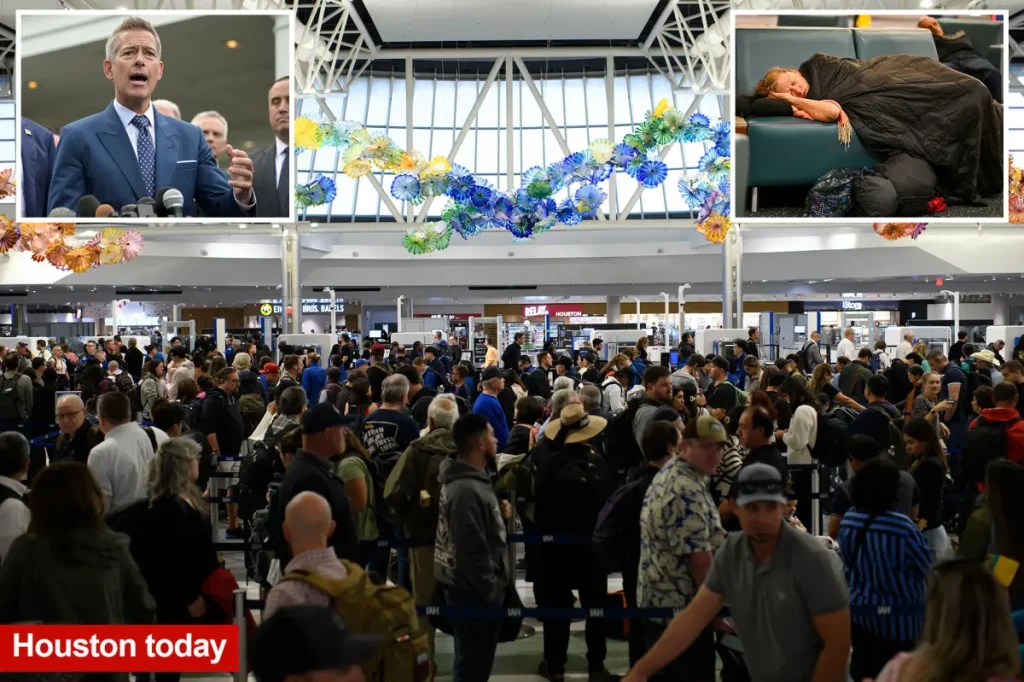Transportation Secretary Warns of Air Travel Chaos as Government Shutdown Continues
Transportation Secretary Sean Duffy issued a stark warning on Tuesday about the potentially devastating consequences for air travelers if the ongoing government shutdown extends into next week. Speaking with notable concern, Duffy painted a troubling picture of what Americans might face: widespread flight delays, mass cancellations, and the possible closure of portions of U.S. airspace due to staffing limitations. His message placed responsibility squarely on congressional Democrats, who he claimed would be responsible for what he described as “mass chaos” in the nation’s transportation system. The situation highlights how the political stalemate in Washington is increasingly threatening to disrupt the daily lives of ordinary Americans who simply want to reach their destinations safely and on time.
The current impasse stems from Senate Democrats having rejected funding proposals thirteen consecutive times. These proposals would have maintained government operations at current spending levels until November 21, providing a temporary solution while longer-term budget negotiations continued. Democratic lawmakers have stood firm in their position, hoping to leverage the situation to secure extensions of health care subsidies that are set to expire at the end of the calendar year. These subsidies, which have helped millions of Americans afford health insurance, represent a significant policy priority for the Democratic caucus, who view their continuation as non-negotiable in budget discussions. The standoff illustrates how policy disagreements about healthcare accessibility have become intertwined with the fundamental functioning of government services.
At the heart of this conflict are the Affordable Care Act tax credits and premium reduction provisions that were initially passed during Barack Obama’s presidency and subsequently expanded under Joe Biden’s administration. These healthcare measures have reduced insurance costs for many middle-class and working families across the country, making medical coverage more accessible to populations that previously struggled to afford adequate protection. Democrats argue that allowing these subsidies to lapse would create financial hardship for vulnerable Americans and potentially increase the ranks of the uninsured. The healthcare provisions have thus become a crucial bargaining chip in negotiations, representing core values about the government’s role in ensuring citizens’ well-being versus concerns about federal spending levels and fiscal responsibility.
As the shutdown enters its second month, Republican leadership has intensified efforts to break the Democratic unified front. House Speaker Mike Johnson of Louisiana and Senate Majority Leader John Thune of South Dakota have specifically targeted moderate Democratic senators, hoping to convince them to vote independently of their party’s position and support reopening the government without the healthcare subsidy extensions. This strategy aims to exploit potential divisions within the Democratic caucus, particularly focusing on those representatives from politically competitive states who might fear electoral consequences from an extended shutdown. The prolonged nature of this shutdown has elevated tensions on both sides of the aisle, with each party believing they hold the moral and political high ground in the standoff.
The transportation sector stands as perhaps the most visible and immediately impactful casualty of the ongoing government impasse. With the Federal Aviation Administration already operating with reduced staffing and resources, air traffic controllers, safety inspectors, and other essential personnel are being stretched to their operational limits. Secretary Duffy’s warning suggests that the system is approaching a breaking point where maintaining normal operations will become impossible without restored funding. For millions of Americans who rely on air travel for business, family obligations, or emergency situations, the prospect of widespread system failures represents more than mere inconvenience—it threatens to disrupt economic activity, separate families, and potentially compromise safety standards that the transportation system has maintained even during previous funding challenges.
As the crisis deepens, the American public finds itself caught in the middle of a political battle with real-world consequences. The transportation disruptions represent just one facet of the broader shutdown impacts, which also affect national parks, federal loans, government services, and the livelihoods of federal workers themselves. The situation has sparked growing public frustration as everyday citizens witness essential services deteriorating while elected officials remain entrenched in their positions. With neither side showing signs of compromise, the looming transportation chaos that Secretary Duffy warned about may become the catalyst that finally forces a resolution—though whether that resolution will address the underlying healthcare concerns or simply defer them to a future political battle remains uncertain. Meanwhile, travelers are left to wonder if their upcoming flights will even depart as scheduled, adding personal anxiety to the already tense national atmosphere.


